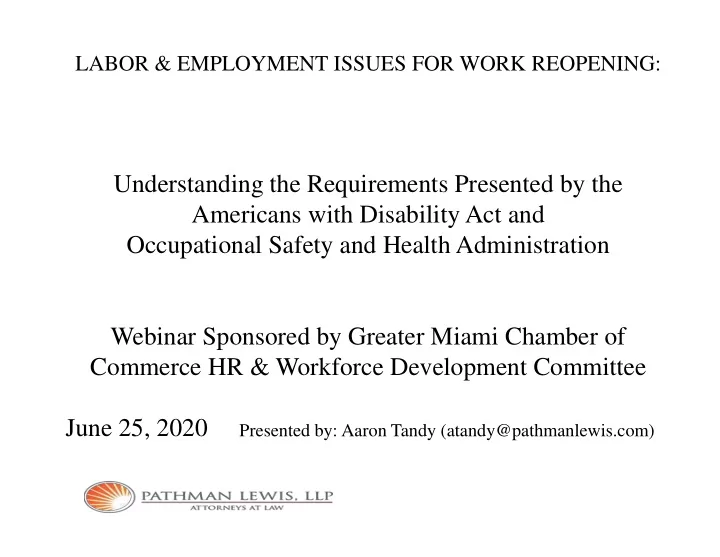

LABOR & EMPLOYMENT ISSUES FOR WORK REOPENING: Understanding the Requirements Presented by the Americans with Disability Act and Occupational Safety and Health Administration Webinar Sponsored by Greater Miami Chamber of Commerce HR & Workforce Development Committee June 25, 2020 Presented by: Aaron Tandy (atandy@pathmanlewis.com)
EEOC Guidance Regarding the ADA The Equal Employment Opportunity Commission (EEOC) has made clear that all of the EEO laws, including the Americans with Disability Act (ADA) and the Rehabilitation Act, continue to apply during the COVID-19 pandemic, including the requirements for reasonable accommodation and non- discrimination based on disability, as well as the rules about employer’s ability to request medical examinations and conduct health inquiries. The EEOC has also made clear that neither the ADA or other EEO laws are intended to interfere with our prevent employers from following guidelines and suggestions made by the CDC or state/local public health authorities.
EEOC Guidance Regarding ADA con’t Pandemic Preparedness in the Workplace and the Americans with Disabilities Act (EEOC publication updated for Covid-19) (updated June 17, 2020) (http://www.eeoc.gov/wysk/what-you-should-know-about-covid-19-and- ada-rehabilitation-act-and-other-eeo-laws) This publication provides a helpful and useful set of guidelines regarding, among other things: +Disability-Related Inquiries and Medical Exams +Confidentiality of Medical Information Collected +Hiring and Onboarding +Providing Reasonable Accommodations +Addressing Pandemic Related Harassment
ADA and Return to Work: Key Points MEDICAL SCREENINGS AND TEMPERATURE CHECKS The ADA permits employers to make COVID-19 medical inquiries and conduct simple medical screenings before allowing employees to enter the workforce; however, employers may NOT require employees to undergo invasive medical examinations before returning to work, which currently includes a requirement that an employee submit to an antibody test (as opposed to a viral test). [OSHA has also cleared employers to undertake such precautions] As a practical matter, under the ADA it is permissible for an employer to: -conduct daily temperature checks of employees and turn away employees whose temperature is to high -ask COVID-19 health screening questions of employees and send employees experiencing symptoms home -require employees as a condition to return to work undergo a viral test -to the extent the information obtained is retained, employers must keep it confidential and secure (separate from employee personnel files)
ADA KEY POINTS con’t. REASONABLE ACCOMMODATIONS The ADA requires that employers with 15 or more employees provide reasonable accommodations to an individual employee with a disability or a medical condition who requests an accommodation as long as the requested accommodation poses neither a undue hardship or significant difficulty to the business. An employer may elect to provide an accommodation even if not legally obligated to do so, such as allowing a broad group of employees to telecommute. However, the ADA does not allow an employer to exclude an individual employee from returning to work simply because the employee has a disability, or is older, placing him or her at a higher risk for severe illness. Only if the employer can meet a significantly high standard that the employee’s disability creates a substantial harm to their own health under 29 C.F.R. section 1630.2(r) may an employer take action absent a request. Moreover, the ADA does not require that an employer accommodate an employee without a disability based on the disability-related needs of a family member.
OSHA GUIDANCE OSHA has issued two publications regarding Covid-19 and Reopening Guidance on Preparing Workplace for COVID-19 (OSHA 3990-03 2020) Guidance on Returning to Work (OSHA 4045-06-2020) Note: OSHA has stressed that the Guidance documents noted above do not create any new legal obligations on employers but are intended to supplement previous regulations and enforcement guidance. In addition, OSHA has issued several enforcement memoranda regarding interim, updated and revised enforcement guidance for employers to follow to develop response plans and reporting of Covid-19 cases in the workplace.
OSHA and Return to Work: Key Points CLEANING AND SANITIZING: OSHA requires that employers ensure that employees have safe and healthy working conditions in which to conduct work on behalf of employers, which includes engaging in thorough daily and periodic cleaning of employees’ workstations and breakrooms, as well as encouraging employees to engage in basic infection prevention measures. It may also require installation of protective barriers in some locations or requiring the use of personal protective equipment in office spaces, as well as possible reconfiguration of office layouts and air vents. This also requires employers to interact with landlords to make sure that common areas and HVAC and other systems are cleaned thoroughly and that a sanitizing protocol is implemented following CDC guidelines.
REOPENING OFFICES: PHASES OSHA recommends that businesses engage in phased reopening after a hazard assessment of the workplace has been conducted. Phase 1: flexible scheduling combining limited numbers of people in the physical space maintaining social distancing and use of PPEs, along with telework where practical and available Phase 2: ease of restrictions on number of personnel on-site while maintaining moderate social distancing and practicing controls to limit exposure Phase 3: Resumption of unrestricted staffing at worksites
Reporting/Recording Cases of COVID-19 Under OSHA’s recordkeeping requirements (29 CFR Part 1904), COVID-19 is a recordable illness and employers are required to record cases of Covid-19 if: a) the case is a confirmed Covid-19 case b) the case is work related c) the case involves one or more recording criteria set forth in 29 CFR 1904.7 Moreover, if an employee is confirmed to have COVID-19 (regardless of the source), employers are required to inform fellow employees about their potential exposure in the workplace while maintaining confidentiality of the employee’s condition under the ADA. OSHA also allows employers to obtain a list of contacts inside the workplace from the infected employee in order to facilitate contact tracing. Finally, to the extent that an employee reports exposure to a COVID-19 infected individual outside the workplace, employers are required to follow CDC guidelines to quarantine the exposed employee outside the workplace.
Recommend
More recommend